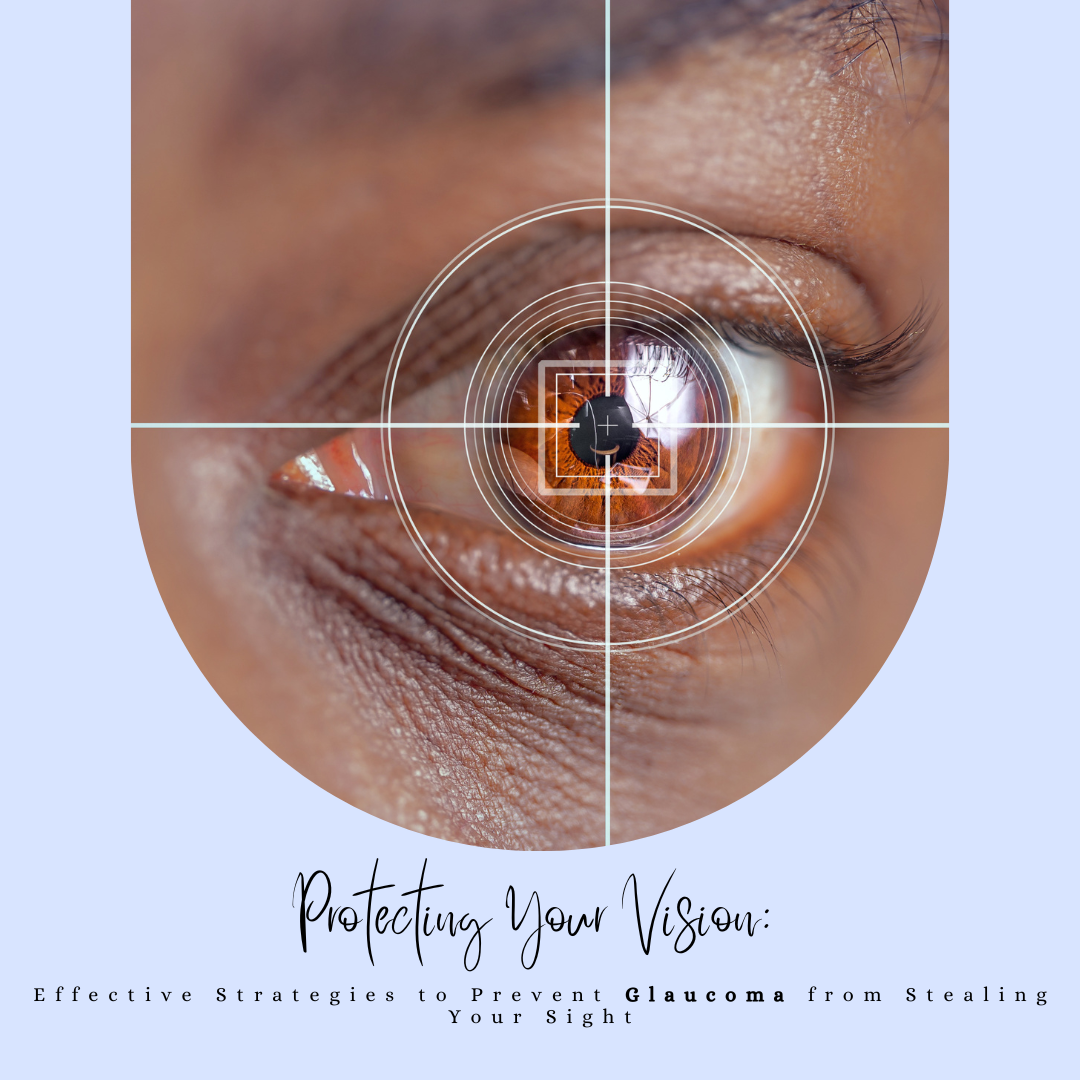When it comes to maintaining good eyesight, glaucoma is a condition that demands attention. Glaucoma is a group of eye disorders that can lead to irreversible vision loss if left untreated. Often referred to as the “silent thief of sight,” glaucoma gradually damages the optic nerve without causing noticeable symptoms in the early stages. However, by implementing proactive measures, you can significantly reduce the risk of glaucoma and safeguard your vision. In this blog, we will discuss essential strategies to prevent glaucoma from stealing your sight.
Regular Eye Exams:
The importance of routine eye exams cannot be emphasized enough. Regular check-ups with an eye care professional allow for the early detection and treatment of glaucoma. As the disease progresses slowly, detecting it in the initial stages can prevent further damage and preserve your eyesight. Aim to have comprehensive eye exams every one to two years, or as recommended by your eye care specialist.
Understand Your Risk Factors:
Understanding the risk factors associated with glaucoma can help you take proactive steps towards prevention. Advancing age, a family history of glaucoma, certain medical conditions (such as diabetes and high blood pressure), and long-term use of corticosteroids are some common risk factors. If you fall into any of these categories, it is vital to be extra vigilant and maintain regular eye examinations.
Maintain Healthy Lifestyle Habits:
Certain lifestyle choices can influence your overall eye health and help prevent glaucoma:
a) Exercise regularly: Engaging in moderate physical activity like walking, swimming, or cycling can help maintain healthy blood flow to the optic nerve and reduce intraocular pressure.
b) Eat a balanced diet: A diet rich in fruits, vegetables, whole grains, and lean proteins, while low in saturated fats and sodium, can promote good eye health. Include foods high in antioxidants, such as leafy greens, carrots, berries, and fish rich in omega-3 fatty acids.
c) Avoid smoking: Smoking can increase the risk of developing glaucoma. Quitting smoking or refraining from starting is crucial for your overall health and well-being, including your eyesight.
Protect Your Eyes:
Taking precautions to protect your eyes from injury is an essential aspect of glaucoma prevention:
a) Wear protective eyewear: When participating in activities with a risk of eye injury, such as sports, construction work, or certain hobbies, make sure to wear appropriate protective eyewear. These glasses or goggles shield your eyes from potential harm.
b) Use UV-protective sunglasses: Prolonged exposure to ultraviolet (UV) rays can contribute to the evelopment of glaucoma. Wearing sunglasses that block 100% of UVA and UVB rays can safeguard your eyes from harmful sun damage.
Monitor Intraocular Pressure:
Intraocular pressure (IOP) is a crucial factor in glaucoma development. Regular IOP checks can help identify any abnormalities and guide appropriate treatment. Your eye care specialist may perform a simple, painless test called tonometry to measure the pressure inside your eyes. If you have elevated IOP, your doctor may recommend additional tests or initiate preventive measures.
In conclusion, glaucoma is a serious eye condition that can lead to permanent vision loss if not detected and treated early. However, by adopting preventive measures and taking proactive steps, you can significantly reduce the risk of glaucoma stealing your sight. Remember the following key points:
Regular eye exams are crucial for early detection and treatment of glaucoma. Schedule comprehensive eye exams every one to two years or as recommended by your eye care specialist.
Understand your risk factors, such as age, family history, and certain medical conditions. If you fall into any high-risk category, be extra vigilant and prioritize regular eye examinations.
Maintain a healthy lifestyle by exercising regularly, consuming a balanced diet rich in eye-healthy nutrients, and avoiding smoking. These habits promote good eye health and can help prevent glaucoma.
Protect your eyes from injury by wearing appropriate protective eyewear during activities that pose a risk. Additionally, shield your eyes from harmful UV rays by wearing sunglasses that block 100% of UVA and UVB rays.
Monitor your intraocular pressure (IOP), as elevated pressure is a significant risk factor for glaucoma. Regular IOP checks can help identify any abnormalities and guide appropriate treatment if necessary.
By implementing these preventive strategies, you take an active role in preserving your vision and overall eye health. Remember, prevention is always better than cure. Don’t wait for symptoms to appear; be proactive in protecting your eyes. Regular eye exams, healthy lifestyle habits, eye protection, and monitoring of intraocular pressure can go a long way in preventing glaucoma from stealing your sight.
Prioritize your eye health, stay informed, and work closely with your eye care professional to ensure the early detection and appropriate management of any eye conditions. Your eyes are precious, so take the necessary steps to safeguard your vision and enjoy a lifetime of healthy eyesight.
